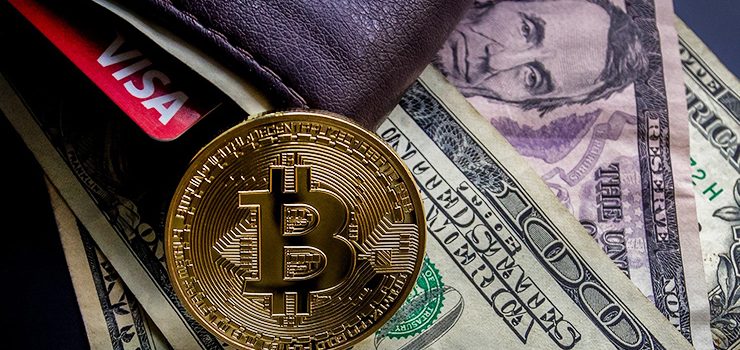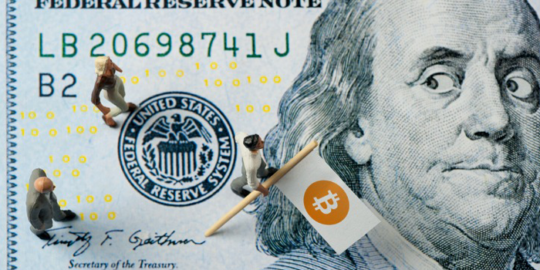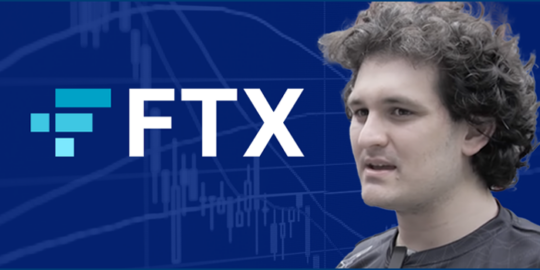Leave it to the U.S. government and the Fed to show us exactly how not to use amazing technology…
The Block reports that throughout March, proposals regarding a “digital dollar” were written into a number of draft coronavirus reliefs packages… This is a terrible idea that would turn digital currencies and the blockchain upside down.
Fortunately, none of these proposals made it to the final bills. That’s a good thing for a few reasons, but first, a refresher on the basics…
When you think of the blockchain, it’s easiest to imagine a giant receipt or ledger of transactions (the “chain” in blockchain).
New transactions can be added (like a normal receipt or ledger), but every entry is permanent and verifiable. That’s because everyone in the ledger has a personal record of the entries before their own (the “blocks” in blockchain) and must agree to all new transactions or changes—so cheating the system means changing every single personal record, ever.
This also sets up the ledger in a way where no one group or person is in control (aka “decentralized”)… allowing trust between two parties without the need for oversight from a third, like a bank or government.
And while blockchain can be used to track everything from logistics to financial transactions, digital currencies are what it’s mainly known for today. Bitcoin, ethereum, and more, all run on a blockchain network.
Considering the above, the call for the U.S. government to use blockchain is understandable… It could improve efficiency across many departments.
But operating digital currency and wallets through the Federal Reserve to help the “under-banked” would be disastrous.
Without blockchain’s decentralized protections in place, a transition to a digital dollar just means the Fed can digitally “print” money and flood the economy with cash even faster.
Not only is it cutting out the mailman and banks for things like stimulus checks… it would allow the Fed to create and fund accounts like a giant bank, expanding its power directly into the pockets of individuals.
Not only would this sidestep hurt banks and credit unions, it would also create bad faith in U.S. currency… With the Fed printing, reporting, and directly maintaining the bank accounts of U.S. citizens, who’s left to confirm the truth in what it’s broadcasting to the world?
You could probably point to government spending and debt levels over the last 30-plus years and make the argument that people can’t lose much more faith in U.S. currency… But recent moves in limited assets like gold and bitcoin show otherwise.
While the Fed and U.S. government have been lowering rates and printing stimulus checks, bitcoin is up 23% year to date (YTD), and gold prices are up 11% YTD. (The S&P 500 is down about 10% over the same period.)
The main driver of this growth is that both bitcoin and gold are limited assets.
Gold, the shiny metal with over 2,000 years of history, needs to be dug out of the ground. And although we don’t know exactly how much gold is on this planet, we do know it’s a limited amount.
The same goes for bitcoin… There will only be a total of 21 million. Ever. And like gold, bitcoin must be mined… Large computers solve complex equations to “mine” new bitcoin, and the process can be time consuming and expensive.
Compare that to a Fed that’s already printing (and devaluing) an unlimited supply of paper money, and you can see why the idea of a Fed-run “digital dollar” has many running for gold and bitcoin.
Headlines about government-sponsored digital currencies are definitely worth paying attention to… but be sure to separate the wolves from the sheep. A digital security operated by the Federal Reserve will be handled just like paper currency… The Fed will print as much as it wants.
As the economic damage from COVID-19 unfolds, more and more governments will have no choice but to keep printing or borrowing money to support their budgets—a massive tailwind for scarce assets.
With a limited supply comes value… and gold and bitcoin offer both.
Daniel Creech is a Curzio Research analyst with over a
decade of experience. He writes on macro trends, large- and small-cap stocks, and
digital securities. He’s a regular contributor to Token Tracker, Curzio Research Advisory, and The Dollar Stock Club.
P.S. Did you catch our webcast last week?
On Thursday, more than 2,000 online viewers joined Frank for our first-ever livestream event, “Navigating the New World Order: A Curzio Research Townhall.”
Frank answered questions on everything from what the experts are missing about the impact of COVID-19… to his outlook for oil, and assets like gold and bitcoin… to his biggest news of the night: a simple strategy designed for volatile markets like these.
In March alone, this strategy returned triple-digit gains five times… we’re talking 100%, 300%, even 500%!
If you missed out last week, you can still watch a FREE replay of this event… but only for a limited time.
Daniel Creech is a Curzio Research analyst with over a
decade of experience. He writes on macro trends, large- and small-cap stocks, and
digital securities. He’s a regular contributor to Token Tracker, Curzio Research Advisory, and The Dollar Stock Club.











Leave it to the U.S. government and the Fed to show us exactly how not to use amazing technology…
The Block reports that throughout March, proposals regarding a “digital dollar” were written into a number of draft coronavirus reliefs packages… This is a terrible idea that would turn digital currencies and the blockchain upside down.
Fortunately, none of these proposals made it to the final bills. That’s a good thing for a few reasons, but first, a refresher on the basics…
When you think of the blockchain, it’s easiest to imagine a giant receipt or ledger of transactions (the “chain” in blockchain).
New transactions can be added (like a normal receipt or ledger), but every entry is permanent and verifiable. That’s because everyone in the ledger has a personal record of the entries before their own (the “blocks” in blockchain) and must agree to all new transactions or changes—so cheating the system means changing every single personal record, ever.
This also sets up the ledger in a way where no one group or person is in control (aka “decentralized”)… allowing trust between two parties without the need for oversight from a third, like a bank or government.
And while blockchain can be used to track everything from logistics to financial transactions, digital currencies are what it’s mainly known for today. Bitcoin, ethereum, and more, all run on a blockchain network.
Considering the above, the call for the U.S. government to use blockchain is understandable… It could improve efficiency across many departments.
But operating digital currency and wallets through the Federal Reserve to help the “under-banked” would be disastrous.
Without blockchain’s decentralized protections in place, a transition to a digital dollar just means the Fed can digitally “print” money and flood the economy with cash even faster.
Not only is it cutting out the mailman and banks for things like stimulus checks… it would allow the Fed to create and fund accounts like a giant bank, expanding its power directly into the pockets of individuals.
Not only would this sidestep hurt banks and credit unions, it would also create bad faith in U.S. currency… With the Fed printing, reporting, and directly maintaining the bank accounts of U.S. citizens, who’s left to confirm the truth in what it’s broadcasting to the world?
You could probably point to government spending and debt levels over the last 30-plus years and make the argument that people can’t lose much more faith in U.S. currency… But recent moves in limited assets like gold and bitcoin show otherwise.
While the Fed and U.S. government have been lowering rates and printing stimulus checks, bitcoin is up 23% year to date (YTD), and gold prices are up 11% YTD. (The S&P 500 is down about 10% over the same period.)
The main driver of this growth is that both bitcoin and gold are limited assets.
Gold, the shiny metal with over 2,000 years of history, needs to be dug out of the ground. And although we don’t know exactly how much gold is on this planet, we do know it’s a limited amount.
The same goes for bitcoin… There will only be a total of 21 million. Ever. And like gold, bitcoin must be mined… Large computers solve complex equations to “mine” new bitcoin, and the process can be time consuming and expensive.
Compare that to a Fed that’s already printing (and devaluing) an unlimited supply of paper money, and you can see why the idea of a Fed-run “digital dollar” has many running for gold and bitcoin.
Headlines about government-sponsored digital currencies are definitely worth paying attention to… but be sure to separate the wolves from the sheep. A digital security operated by the Federal Reserve will be handled just like paper currency… The Fed will print as much as it wants.
As the economic damage from COVID-19 unfolds, more and more governments will have no choice but to keep printing or borrowing money to support their budgets—a massive tailwind for scarce assets.
With a limited supply comes value… and gold and bitcoin offer both.
P.S. Did you catch our webcast last week?
On Thursday, more than 2,000 online viewers joined Frank for our first-ever livestream event, “Navigating the New World Order: A Curzio Research Townhall.”
Frank answered questions on everything from what the experts are missing about the impact of COVID-19… to his outlook for oil, and assets like gold and bitcoin… to his biggest news of the night: a simple strategy designed for volatile markets like these.
In March alone, this strategy returned triple-digit gains five times… we’re talking 100%, 300%, even 500%!
If you missed out last week, you can still watch a FREE replay of this event… but only for a limited time.